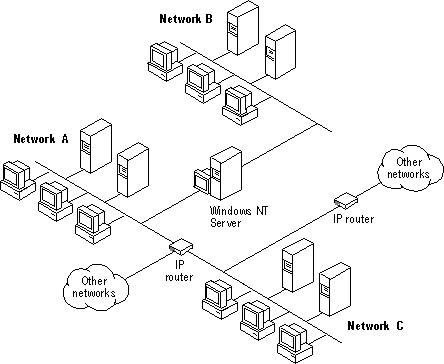Using TCP/IP for Scalability
TCP/IP delivers a scalable internetworking technology widely supported by hardware and software vendors.
When TCP/IP is used as the enterprise-networking protocol, the Windows-based networking solutions from Microsoft can be used on an existing internetwork to provide client and server support for TCP/IP and connectivity utilities. These solutions include
- Microsoft Windows NT Workstation, with enhancements to support wide area networks (WAN), TCP/IP printing, FTP, Telnet, DHCP, WINS, and DNS client software, Windows Sockets, and extended LMHOSTS file.
- Microsoft Windows NT Server, with the same enhancements as Windows NT Workstation, plus Internet Information Server, DHCP Server, WINS Server, and DNS Server software.
- Microsoft Windows 95, with enhancements to support wide area networks (WAN), DHCP, WINS, and DNS client software, extended LMHOSTS file, and Windows Sockets.
- Microsoft TCP/IP-32 for Windows for Workgroups, with Windows Sockets support, can be used to provide access for Windows for Workgroups computers to Windows NT, LAN Manager, and other TCP/IP systems. Microsoft TCP/IP-32 includes DHCP, WINS and DNS client software.
- Microsoft LAN Manager — including both client and server support for Windows Sockets — and MS-DOS–based connectivity utilities. The Microsoft Network Client 2.0 software on the Windows NT Server compact disc includes new Microsoft TCP/IP support with DHCP and WINS clients.
As shown in Figure 30.2, the current version of TCP/IP for Windows NT also supports IP routing in systems with multiple network adapters attached to separate physical networks (multihomed systems).

Figure 30.2 TCP/IP for Windows NT Supports IP Routing for Multihomed Systems

